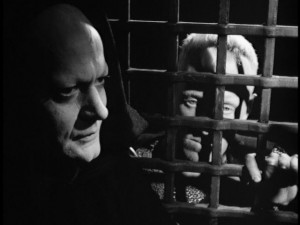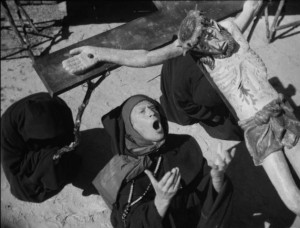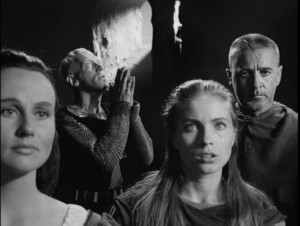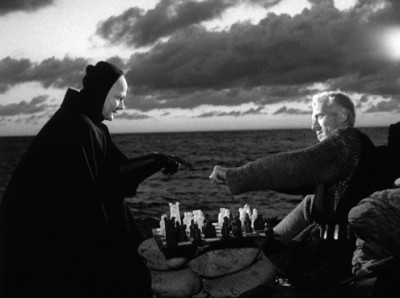
Yes, The Seventh Seal is probably the single biggest old warhorse of art-house cinema. But there’s a reason it achieved that status: It’s so damned good. When it first appeared, it was not at all like anything else that had come before it. It wasn’t even like Bergman. Oh, sure, there had been movies in which Death was personified, and Karloff and Lugosi had played a life-and-death chess game in Edgar G. Ulmer’s The Black Cat way back in 1934. (You can take the idea at least as far back as Mr. Coleridge’s Rime of the Ancient Mariner where the lady in the “naked hulk” shoots craps with Death.) But none of these—however connected—are quite like Bergman’s dark fantasy where a knight (Max von Sydow) returning from the Crusades buys time on his journey through the plague-ravaged countryside by challenging Death (Bengt Ekerot) to a chess game. Reduced to its simplest level, that’s the essence of the film, but because the game is played out in a series of sessions along the journey, it takes on the Knight’s spiritual quest in the process. The results are startling, a little disurbing, iconic and magical—all the more so (especially in light of the way “important” films tend toward bloat) for being a trim 96 minutes long and containing a good amount of dark comedy. It is also one of those rare films that seems to offer something new every time you see it.

There is probably nothing in this film that has not been examined—from its opening with the bird suspended motionless in the sky by air currents as a symbol of the knight hovering between life and death (as well as reperesenting the “silence in heaven” after the opening of the Seventh Seal in the Book of Revelation) to the final fade-out. I think this is less a case of a film being over-analyzed than it’s the simple fact that the film suggests a wealth of mysteries hidden away in it. In a sense, Bergman turns all of us into von Sydow’s Antonius Block. Like him, we never stop asking questions about the meaning of it all—at least in the film. And the film is perhaps like Death himself, who claims to have no secrets and to be “unknowing.”

The film’s influence is certainly without question. It had more than a little bearing on the Roger Corman’s horror film Masque of the Red Death (1964)—even to a pretty direct, let’s say borrowing of Death being “unknowing.” (And wasn’t The Seventh Seal always something of a horror picture?) Some of its imagery clealy informs Ken Russell’s The Devils (1971), and although Russell and Bergman have different things on their minds with the two films, I can’t but wonder if Russell’s idea to play the citizens of 1634 Loudun as people who think of themselves as modern has its roots in the squire Jons (Gunnar Bjornstrand) referring to the peasants here as “modern people.” Of course, it—and Bergman in general—is at the heart of Woody Allen’s Love and Death (1975). And evocations of Bengt Ekerot’s Death are everywhere from the 1968 parody short De Duva to Last Action Hero (1993). It’s rare that an art film becomes so completely absorbed into pop culture.

What struck me watching the film this time was how the film plays as a kind of fragmented portrait of Bergman himself. In fact, it reminded me of Josef von Sternberg’s answer to John Baxter’s question about which character in a film represented him—“All of my characters represent me.” When pressed on the matter Sternberg claimed they all represented him “spiritually.” Well, in The Seventh Seal we have glimmers of many faces of Bergman. In some ways, he’s the eternally questioning knight, but he’s also the slightly goofy strolling player (Nils Poppe), who is also an artist who has visions. At the same time, he can be seen as the cynical squire who finds everyone and everything a little ludicrous and comical—and empty and pointless. And, of course, Bergman as writer and director is Death as well, since the fates of his characters are in his hands. And beyond that? Who can say, but I’m betting there’s a little Bergman in more than a few others. Try it and see.




Oh, sure, there had been movies in which Death was personified
I’ve been wondering…do you think it’s facile to suggest that Death in The Seventh Seal was inspired in some small part by Death in Fritz Lang’s Destiny? I recognize that the comparison isn’t very exact — Bergman’s Death is much wryer than Lang’s — but their dress and gestures seem similar to me.
In fact, it reminded me of Josef von SternbergТs answer to John BaxterТs question about which character in a film represented himЧУAll of my characters represent me.Ф When pressed on the matter Sternberg claimed they all represented him Уspiritually.Ф
This is one of the aspects of the film that makes it so resonant for me: it examines religion from multiple perspectives (the naяve faith of Jof, Block’s agonized desire to believe, JЎns’ cynical atheism) without caricaturing or stacking the deck in favor of any one.
I’ve been wondering…do you think it’s facile to suggest that Death in The Seventh Seal was inspired in some small part by Death in Fritz Lang’s Destiny? I recognize that the comparison isn’t very exact — Bergman’s Death is much wryer than Lang’s — but their dress and gestures seem similar to me.
I can’t say it’s ever occurred to me. Visually, I’d say not so much — unless I’m misremembering, Lang’s Death has neither a cowl, nor gloves. I would need to see Destiny again to have an opinion on the gestures and I don’t have a copy of it at hand.
without caricaturing or stacking the deck in favor of any one.
This is one of the reasons I think they all represent some aspect of Bergman.
I canТt say itТs ever occurred to me.
I suppose it’s entirely probable that two different directors could come up with the idea of Death wearing black….
This is one of the reasons I think they all represent some aspect of Bergman.
You know, the first time I saw The Seventh Seal, I arrived at the same conclusion, but I also concluded that Bergman-as-JЎns ultimately won out.
Now, I’m no longer so sure. It’s Jof who gets the happy ending (such as it is), and even Block seems to achieve a measure of triumph by saving Jof.
(I like your comment about Death being a part of Bergman as well; I hadn’t considered that angle.)
I suppose it’s entirely probable that two different directors could come up with the idea of Death wearing black….
I think the image of the grim reaper in a black robe predates them both, though.
Now, I’m no longer so sure. It’s Jof who gets the happy ending (such as it is), and even Block seems to achieve a measure of triumph by saving Jof.
I suspect that’s the beauty of it and it will change for you again over time.